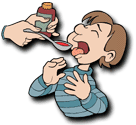|
You've
heard the warnings: Over time, using antibiotics can build
resistance to their infection-fighting properties, eventually
rendering them useless as treatment options. Still, an increasing
number of doctors continue to prescribe antibiotics even when
no infection exists -- such as when symptoms are associated
with the common cold, or when research demonstrates their
ineffectiveness. Take as example a recent study that penicillin,
a commonly prescribed antibiotic, does not reduce the duration
of acute sore throat symptoms.
Researchers studied 156 children, ages 4-15, with a sore
throat for fewer than seven days and meeting at least two
of four other criteria, including history of fever, absence
of cough, swollen lymph nodes, or red or swollen tonsils.
Participants received either penicillin for seven days; penicillin
for three days, followed by placebo for four days; or placebo
for seven days.
 Results: The study found virtually no differences
in terms of symptom duration in the three study groups, and
that sore throat actually resolved 1.3 days later, on average,
in the three-day penicillin group compared to the group receiving
placebo only. Results: The study found virtually no differences
in terms of symptom duration in the three study groups, and
that sore throat actually resolved 1.3 days later, on average,
in the three-day penicillin group compared to the group receiving
placebo only.
The authors make their findings perfectly clear: "Treatment
with penicillin for seven days failed to shorten the duration
of sore throat, reduce non-attendance at school, or reduce
recurrence of sore throat in the following six months." These
results were maintained even in children diagnosed with the
presence of group A streptococci (which can cause strep throat,
among other complications). The authors conclude that nearly
all children in the Western world can be treated for sore
throat safely without the use of penicillin; however, parents
are still encouraged to seek a doctor's care to rule out more
serious potential illnesses.
Reference:
Zwart S, Rovers MM, de Melker RA, et al. Penicillin for acute
sore throat in children: randomized, double-blind trial. British
Medical Journal (online), Dec. 6, 2003. www.bmj.com.
For more information on child illnesses, visit www.chiroweb.com/find/tellmeabout/childhood.html.
|



